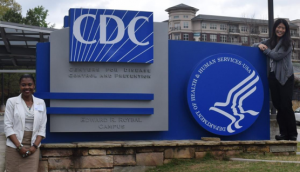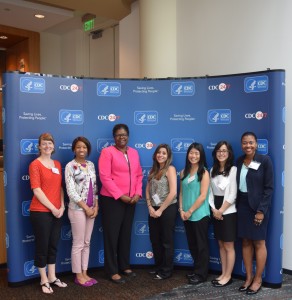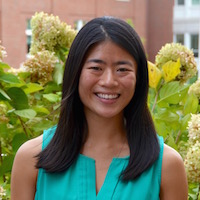Lessons learned at 2016 Millennial Health Leaders Summit
April 5, 2016
This post was written by Samantha Croffut, a graduate student of nutrition at the UNC Gillings School of Global Public Health. She was invited to attend the 2016 Millennial Health Leaders Summit as a student delegate.
The Centers for Disease Control and Prevention (CDC) Millennial Health Leaders Summit was convened to train the next generation of public health leaders in order to eliminate health disparities and promote health equity.
Participants represented a diverse array of geographic locations and disciplines, ranging from Washington state to Florida and from medical students to doctoral candidates. While I was in excellent company, I did feel surprised to be the sole representative from the field of nutrition among more than 50 attendees.
Anna Schuchat, MD, principal deputy director of the CDC, opened the summit. Throughout our two-day visit, the student delegates had the honor of interacting with several CDC experts as well as distinguished faculty from the top schools of public health. I’m also fairly certain that we crossed paths with some of the world’s most renowned epidemiologists, as a high-level summit on the Zika virus was taking place at the same time. Upon meeting these incredible individuals, I found comfort in observing them as down-to-earth people.
Many of our facilitators were frank about historical public health blunders and well-intentioned but misaligned practices used in the past. We discussed how the traditional medical model has used a disparities-based framework to close gaps on health disparities, but the social ecological model has the capacity to increase impact and sustainability even more as an equities-based framework focused on root causes.

Marie Lina Excellent and Sam Croffut (L-R) smile outside the Centers for Disease Control and Prevention campus. (Photo courtesy of Marie Lina Excellent)
We also explored how public health professionals historically have told communities what they need rather than realizing that communities themselves may know their own needs best. We analyzed how leadership traditionally has been defined for students as XYZ, rather than acknowledging that the actual definition is much less simplistic and more circumstantial.
Dale Trevino, PhD, associate dean for diversity and inclusion at Princeton University’s Graduate School, led our session on leadership. He spoke about the power of “I.” Pulling together what I’ve learned from the summit, I believe that leadership comes in all shapes, sizes and forms. It’s based less on a list of experiences and more on personal integrity – being true to who we are.
Among the student delegates, who had each been nominated by our schools to attend this invigorating health summit, the range of experiences was vast. I was equally inspired when talking with an undergraduate who is simultaneously pursuing two degrees in health communications as I was upon hearing from a doctoral candidate who is finishing her dissertation on the eradication of polio.
As a group, we heard from some of the leading experts in the field of public health, and we were made aware that they are indeed only human and capable of making mistakes. However, they also have made a conscious effort to own up to those mistakes and instigate real change.
Trevino ended our session with three thoughts: 1) think of where you are now, 2) think of where you want to be and 3) think of how you will get there.

UNC students pose with Dr. Leandris (in pink), director of the Office of Minority Health and Health Equity at the CDC and a Gillings School alumna. (Photo courtesy of Marie Lina Excellent)
Leandris Liburd, PhD, is director of the Office of Minority Health and Health Equity at the CDC and a Gillings School alumna. In her talk, she affirmed that dedication to public health issues requires a career-long commitment. My belief is that true leadership encompasses a lifelong commitment to personal development.
Part of that development is a willingness to adjust the language we use. By the end of the summit, I had a few key “terminology takeaways” that will change how I refer to my work in public health:
- Use the word “patterns” in place of “stereotypes” – our perceptions are based on historical patterns.
- Use “traffic crashes” in place of “traffic accidents” – crashes can be avoided through urban planning that promotes walking and biking while reducing risk of injury.
- Focus on country of origin rather than racial labels – labels like Latino/Hispanic are irrelevant when working with populations such as those in Guatemala who may not speak Spanish or any related language.
I enrolled at UNC Gillings to pursue a dual degree as a Master of Public Health and Registered Dietitian. My goal is to become a leading advocate for global public health nutrition by focusing on optimal nutrition and equitable health outcomes. More than ever, I plan to achieve that goal by supporting other dietitians to become consciously involved in health equity work around the globe and by engaging with multiple sectors and disciplines working toward a common goal.
Gillings School of Global Public Health contact: David Pesci, director of communications, (919) 962-2600 or dpesci@unc.edu

